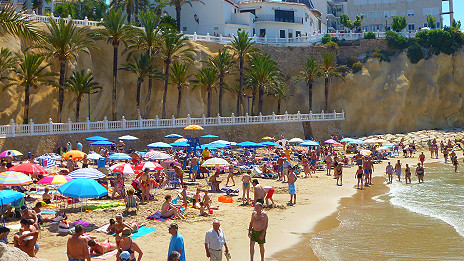Skin cancer 皮膚癌發(fā)病率增長(zhǎng)與廉價(jià)全包假期有關(guān)
媒體英語(yǔ)會(huì)帶大家一起學(xué)習(xí) BBC 撰稿人在報(bào)道世界大事時(shí)常用到的單詞和短語(yǔ)。

Benidorm in Spain is a classic holiday destination for Britons
收聽(tīng)與下載
英國(guó)癌癥研究機(jī)構(gòu)說(shuō),60年代開(kāi)始盛行的廉價(jià)全包旅行假期很可能是導(dǎo)致英國(guó)退休人群皮膚癌發(fā)病率“另人擔(dān)憂的增長(zhǎng)”的部分原因。此機(jī)構(gòu)還說(shuō),40多年前人們還沒(méi)有意識(shí)到應(yīng)該如何保護(hù)自己的皮膚。以下是 Sophie Hutchinson 的報(bào)道。
The skin cancer malignant melanoma is one of the most common cancers in the UK, and kills more than 2,000 people here each year. Figures from the charity Cancer Research UK show just how sharply cases have risen in the past 40 years.
Back in the mid-70s just 600 pensioners were diagnosed with the disease each year, compared to almost 6,000 a year in 2010. And the rates were worst for older men who were ten times more likely to be diagnosed with skin cancer than their parents.
Women were five times more likely. Researchers believe the rise in the number of cases with this, the most dangerous skin cancer, is likely to be linked to the boom more than 40 years ago in cheap foreign holidays and the fashion for a deep suntan.

